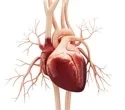According to a clinical trial conducted by scientists at Sweden’s Karolinska Institutet and Karolinska University Hospital, the hormone ghrelin, which causes hunger, can improve heart failure patients’ ability to pump blood. The European Heart Journal has published the findings.
Heart failure, a disorder in which the heart’s ability to pump blood, can occur after a myocardial infarction or angina, affects millions of individuals worldwide. Heart failure occurs when the heart’s muscle weakens, making it unable to pump as much blood as is required to supply the body with enough oxygen and nutrients. Treatments are available that slow the progression of the disease, but there are no methods that directly increase the heart’s pump function.
The cardiac muscle tissues have several ghrelin receptors, which are endogenous hormones. It boosts the release of growth hormones and enhances hunger. The scientists think that increasing the heart’s ability to pump blood through its receptors is a promising goal. In this double-blind study, 30 heart failure patients in the cardiology department of Karolinska University Hospital were divided into two groups at random and given either ghrelin, an active therapy, or a placebo intravenously for two hours. After two to five days, the subjects were followed up with.
Following two hours of therapy, the ghrelin group’s average increase in cardiac output—the amount of blood the heart pumps out in one minute—was 28 percent higher than that of the placebo group, which had experienced a slight decrease. As the heart rate was either stable or even slightly decreased, the reason for the rise was that the heart was pumping out more blood every beat. The pump capacity was 10% greater in the ghrelin group than in the placebo group at the two- to five-day follow-up.
No significant adverse effects were noticed by the researchers. A biomarker for heart failure was marginally higher in the ghrelin group for unexplained reasons, but additional research is required to see whether there is any real connectionTo study the underlying mechanisms responsible for the increase in pump function, the researchers also studied mouse heart cells in the laboratory. They observed that treatment with ghrelin increased the contractile function of the heart cells, and they identified a novel molecular mechanism for this increase.
The researchers now want to conduct larger clinical studies and with the help of the KI incubator KI Innovations have launched AnaCardio, a start-up company that develops molecules designed to activate the ghrelin receptors and thus increase the heart’s pump function.
Some of the researchers have reported potential conflicts of interest, including consultancy and lecture fees from various pharmaceutical companies. Lars Lund is the founder of AnaCardio, which is developing a ghrelin-based therapy for heart failure.





